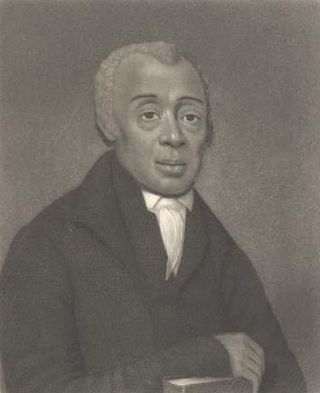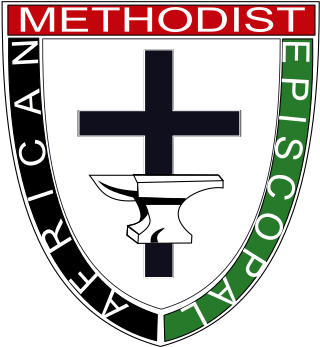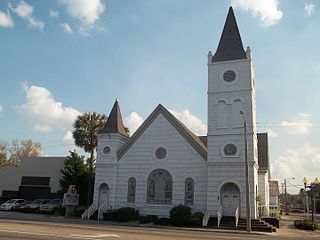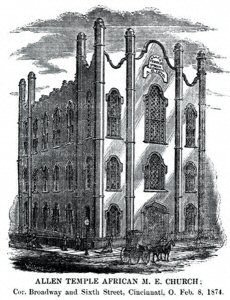
Richard Allen was a minister, educator, writer, and one of the United States' most active and influential black leaders. In 1794, he founded the African Methodist Episcopal Church (AME), the first independent Black denomination in the United States. He opened his first AME church in 1794 in Philadelphia.

The African Methodist Episcopal Church, usually called the AME Church or AME, is a Methodist denomination based in the United States. It adheres to Wesleyan–Arminian theology and has a connexional polity. It cooperates with other Methodist bodies through the World Methodist Council and Wesleyan Holiness Connection.

The Mother Bethel African Methodist Episcopal Church is an historic church and congregation which is located at 419 South 6th Street in Center City Philadelphia, Pennsylvania, USA. The congregation, founded in 1794, is the oldest African Methodist Episcopal congregation in the nation.

The Black Church is the faith and body of Christian denominations and congregations in the United States that predominantly minister to, and are also led by African Americans, as well as these churches' collective traditions and members.

Daniel Alexander Payne was an American bishop, educator, college administrator and author. A major shaper of the African Methodist Episcopal Church (AME), Payne stressed education and preparation of ministers and introduced more order in the church, becoming its sixth bishop and serving for more than four decades (1852–1893) as well as becoming one of the founders of Wilberforce University in Ohio in 1856. In 1863, the AME Church bought the college and chose Payne to lead it; he became the first African-American president of a college in the United States and served in that position until 1877.

The Allen Temple AME Church in Cincinnati, Ohio, US, is the mother church of the Third Episcopal District of the African Methodist Episcopal Church. Founded in 1824, it is the oldest operating black church in Cincinnati and the largest church of the Third Episcopal District of the AME Church.
Black Methodism in the United States is the Methodist tradition within the Black Church, largely consisting of congregations in the African Methodist Episcopal (AME), African Methodist Episcopal Zion, Christian Methodist Episcopal denominations, as well as those African American congregations in other Methodist denominations, such as the Free Methodist Church.

The St. Paul A.M.E. Church is a historic American Gothic Revival style African Methodist Episcopal Church located in Raleigh, North Carolina. A red brick and frame structure built in 1884 by black masons, St. Paul's was the first independent congregation of African Americans in Raleigh and is the oldest African-American church in Wake County, North Carolina. Before the end of the Civil War, the future founders of St. Paul's had been slave members of the Edenton Street United Methodist Church. The members of the church began calling their congregation "St. Paul's" in 1848. The church was listed on the National Register of Historic Places in November 1987 and is also a Raleigh Historic Landmark.

Charles Street African Methodist Episcopal Church is an historic African Methodist Episcopal Church at 551 Warren Street in Boston, Massachusetts. The current church building was built in 1888 by J. Williams Beal and added to the National Register of Historic Places in 1983.

Wesley A.M.E. Zion Church is an historic church, which is located at 1500 Lombard Street in Philadelphia, Pennsylvania. Added to the National Register of Historic Places in 1978, it also appears in the Philadelphia Register of Historic Places and the Pennsylvania State Historic Resource survey.

Henry Logan Memorial African Methodist Episcopal Church is a historic African Methodist Episcopal church at Ann & 6th Streets in Parkersburg, Wood County, West Virginia. It was built in 1891, and is a brick and stone church building in a vernacular Romanesque style. It features three round arched stained glass windows on the front facade and a square, pyramidal roofed corner tower.

The British Methodist Episcopal (BME) Church, Salem Chapel was founded in 1820 by African-American freedom seekers in St. Catharines, Ontario. It is located at 92 Geneva St., in the heart of Old St. Catharines. The church is a valued historical site due to its design, and its important associations with abolitionist activity.

Hayti, also called Hayti District, is the historic African-American community that is now part of the city of Durham, North Carolina. It was founded as an independent black community shortly after the American Civil War on the southern edge of Durham by freedmen coming to work in tobacco warehouses and related jobs in the city. By the early decades of the 20th century, African Americans owned and operated more than 200 businesses, which were located along Fayetteville, Pettigrew, and Pine Streets, the boundaries of Hayti.

The Bethel A.M.E. Church, known in its early years as Indianapolis Station or the Vermont Street Church, is a historic African Methodist Episcopal Church in Indianapolis, Indiana. Organized in 1836, it is the city's oldest African-American congregation. The three-story church on West Vermont Street dates to 1869 and was added to the National Register in 1991. The surrounding neighborhood, once the heart of downtown Indianapolis's African American community, significantly changed with post-World War II urban development that included new hotels, apartments, office space, museums, and the Indiana University–Purdue University at Indianapolis campus. In 2016 the congregation sold their deteriorating church, which was repurposed into part of a new hotel. The congregation built a new worship center at 6417 Zionsville Road in Pike Township in northwest Indianapolis.

Jordan Winston Early was an American Methodist preacher who is considered to have contributed significantly to the spread of African American Methodism in the southern and western United States. In 1868, he married Sarah Jane Woodson Early, and the couple were prominent in spreading Methodism and black nationalism, with his wife teaching wherever he preached.

The Ward Chapel AME Church is a historic African Methodist Episcopal Church building at 319 N. 9th Street in Muskogee, Oklahoma. It was built in 1904, three years before Oklahoma achieved statehood. It was added to the National Register in 1984.

Bethel AME Church of Crawfordsville is a historic African Methodist Episcopal church located at Crawfordsville, Montgomery County, Indiana. It was built in 1892, and is a one-story, gable fronted frame building on a brick foundation. It features a large round-arched window and two-story, square corner tower. Portions of the building are believed to date to 1847. Also on the property is a contributing one-story, Queen Anne style cottage that served as the original parsonage.

Quinn Chapel African Methodist Episcopal (AME) Church was the first Black church to be founded in Lincoln, Nebraska.

The A.M.E. Zion Church of Kingston is an African Methodist Episcopal Zion Church located in Kingston, New York. Founded in 1848, as a land grant from wealthy Black residents, Mrs. Sarah-Ann Hasbrouck and her husband, Alexander, it is the oldest continuous African-American congregation in Kingston and Ulster County. The church is located at 26 Franklin Street in the city's Fourth Ward.




















